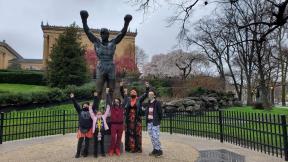
Islamophobia is a pervasive and persistent problem for Muslims who live in the West. Negative stereotypes are perpetuated by media outlets and political leaders, often equating Islam with terrorism and painting Muslims as a threat to humanity. As a result, many Muslims feel marginalized and excluded from mainstream society, leading to a sense of alienation and mistrust. And, despite efforts to combat this unruly situation, Muslims far and wide continue to experience discrimination and harassment on a daily basis, creating a climate of fear and insecurity.
Research reveals that perceived Muslim perpetrators of violence are subject to more severe legal charges and up to three times the prison sentence as perpetrators not perceived to be Muslim. Muslims are also much more likely to be targeted for entrapment, such as undercover law enforcement operations providing them with weapons or fake explosives. There are even instances where many Muslims, including our youth, are monitored under surveillance programs without suspicion or accusation of crime.1
Anti-Muslim hate groups have also gained much traction in recent years. Research has exposed a well-funded and organized Islamophobia network spurring and fueling anti-Muslim activity across various platforms, especially on the social media. Organizations such as ACT for America and Understanding the Threat hold anti-Muslim rallies and talks across the U.S.
Amidst these grueling atrocities, there is guidance for Muslims from Allah on how to tackle these challenges. Allah mentions in the Quran:
"You will surely be tested in your possessions and in yourselves. And you will surely hear from those who were given the Scripture before you and from those who associate others with Allāh much abuse. But if you are patient and fear Allah - indeed, that is of the matters [worthy] of resolve."
(Surah Al-Imran, 3:186)
The Quran was revealed to mankind as guidance, reassurance and comfort. And, it is trying times like these when we need it the most, to serve us as a reminder of the power of Allah over the alleged ability of those who He created. The Seerah of our Prophet Muhammad, peace and blessings be upon him, is filled with examples of this guidance. When Muslims were persecuted in Makkah, they endured the hatred and assault from the disbelievers with patience. Then came Allah’s command to the Prophet to migrate to Madinah. In the new city they found peace and a reward for remaining steadfast.
"but if you persevere patiently, and have Taqwa, then verily, that will be a determining factor in all affairs."
(Surah Al-Imran, 3:186)
Reflecting on the above verses, Muslims are reminded that as believers we will face tests and trials in our lives, both in terms of our material possessions and personal circumstances. This is a fundamental aspect of our existence, as Allah tests us to see how we respond to the challenges that we face.
And it is not that Allah does not acknowledge our pain and suffering. In another surah or chapter of the Quran, He mentions:
"Many of the People of the Scripture (Jews and Christians) wish that they could turn you away as disbelievers after you have believed, out of envy from their own selves, even after the truth has become manifest unto them. But forgive and overlook, till Allah brings His command."
(Surah Al-Baqarah, 2:109)
This verse goes on to reiterate and prove that, every person who stands for truth, enjoins righteousness and forbids evil, will be tested in some manner, but in such cases, there is no cure better than being patient in Allah's cause, trusting in Him and returning to Him for help.
Adopting a Mindful Approach to Islamophobia
The Quran and Sunnah teach us to be kind, compassionate, and respectful towards others, regardless of their faith or background. And, although it is true that many Muslims are marginalized when it comes to practicing their beliefs, we need to be mindful that our responses to adversity align with Islamic values.
The following are some action steps that we can take to counter the impact of Islamophobia at a personal and community level.
1. Believe in Allah.
The love that the believers have for Allah helps them endure the pain from difficulties and hardships. We see examples from the life of the early converts such as Bilal, may Allah be pleased with him, who was tormented with a boulder placed on his chest and dragged along the hot desert sand. In response, he called out to his lord with His name “Ahad” and bore the pain as a warrior.
In some instances, the biases shown against Muslims is a way of illiciting a response that can further be used to propagate hate against them. As believers, we need to remember that Allah does not miss a thing and He is surely watching over us. And, He has also provided reassurance that the reward for test, will be to that extent or perhaps greater, inshaAllah, God willing.
2. Do your homework and learn more about this topic.
To combat the promotion of hatred against Islam and Muslims, it is crucial to understand the scope and influence of the Islamophobia industry. Education is key and one must educate oneself and others using authentic sources. Topics to focus on include the anti-Shariah movement, violence motivated by ideological differences, facts about immigration and crime, media double standards, and challenges faced by mosques.
3. Speak up yourself.
The importance of speaking up against injustice and advocating for the rights of minority groups cannot be overstated. Discrimination, hate speech, and vandalism of mosques are not only harmful to Muslims, but they also undermine the values of equality and human rights. It is imperative to use factual information to counter anti-Muslim rhetoric and to hold elected officials accountable for their actions and statements. By being informed and taking action, individuals can play a vital role in promoting inclusivity and diversity in society.
4. Take part in collective responses.
Organizing and mobilizing communities is crucial to promoting social change and combating hate. Building relationships with diverse groups, including interfaith allies, and publicly demonstrating solidarity can help to promote inclusivity and diversity. By taking collaborative action to prevent or respond to hate-based events can help to prevent further harm and promote a sense of collective responsibility within the community. Allah's Messenger, peace and blessings be upon him, reminds us that we have a responsibility to do so. The Prophet said:
“Whosoever of you sees an evil, let him change it with his hand; and if he is not able to do so, then [let him change it] with his tongue; and if he is not able to do so, then with his heart - and that is the weakest of faith.”
(Sahih Muslim)
Additionally, being a civic neighbor and engaging with the Muslim community can promote mutual understanding and respect. In this manner, interfaith activities curing times of ease can go along way in ensuring that allies step up to the plate with us in our time of need.
5. Be wary of media bias.
There is substantial evidence that the media - news programming (print and broadcast), television, and films - consistently portrays Muslims and Islam in a negative light. We have to be active to change that narrative.
Publicly voicing support for the Muslim community and challenging hateful rhetoric is essential to promoting inclusivity and combating discrimination. Writing op-eds and letters to the editor can help to raise awareness about issues facing the Muslim community and promote a more nuanced understanding of Islam.
Additionally, many Muslims have faced discrimination and unequal treatment due to misconceptions around terrorism and Islam. By questioning these narratives and advocating for fair and just treatment, we can promote a more equitable society. Advocating for freedom of religion is also crucial in protecting the rights of all individuals to practice their faith without fear of discrimination or persecution.
It is also important to recognize that spreading falsehoods is not limited to the media, and that individuals and groups may also engage in spreading misinformation through social media, word-of-mouth, and other channels. Some individuals may have a tendency to seek out news sources that confirm their preexisting beliefs, which can contribute to the spread of misinformation and falsehoods. Therefore, it is important to approach media coverage critically and to seek out reliable sources of information for ourselves, too. There is a balance needed, too, and to check that box, tap into our uniquely Muslim voice on Muslim Network TV. For up-to-date news coverage, visit muslimnetwork.tv/news regularly.
It is also important to actively engage with diverse viewpoints and to fact-check claims before accepting them as true.
6. Connect to potential allies.
It is important to oppose the creation of new domestic terrorism laws that could be used to target marginalized communities unfairly. And, this can be done by pushing for local resolutions that promote inclusivity and reject hate.
Furthermore, forming coalitions and strategic alliances to counter anti-Shariah legislation can also help to protect the rights of individuals to practice their faith without fear of discrimination or persecution.
7. Make dua.
Lastly, and most importantly, know that Allah responds to your silent speech. Speak to Him from your mind, from your soul, and from your heart. Tell him about your worries. Tell him how tired you are and how you in need of Him and His support. Acknowledge your matters to Him and you will sense a level of closeness develop within you. Indeed Allah loves this act of His believers when they call unto him with desperation. There is nothing that can alter fate, better than a believer's duas.
InshaAllah, by channeling our efforts at an individual level and collectively within our communities we can strengthen each other to confront the challenges that abound. And in this way, we can teach our future generations, too, that being a Muslim is not something to be ashamed of but rather to adorn as a symbol of pride and peace.
End Notes
Further Reading
How to be a good ally: advice from American Muslim and Arab American leaders
Umm Ahmed is an early childhood educator and mother of three boys. Always on the quest to learn, she is passionate about seeking knowledge and passing it on to others. A writer in the making, she draws inspiration through deep conversations, laws of nature, and her own children. She and her family are currently living in Abu Dhabi, UAE




Add new comment